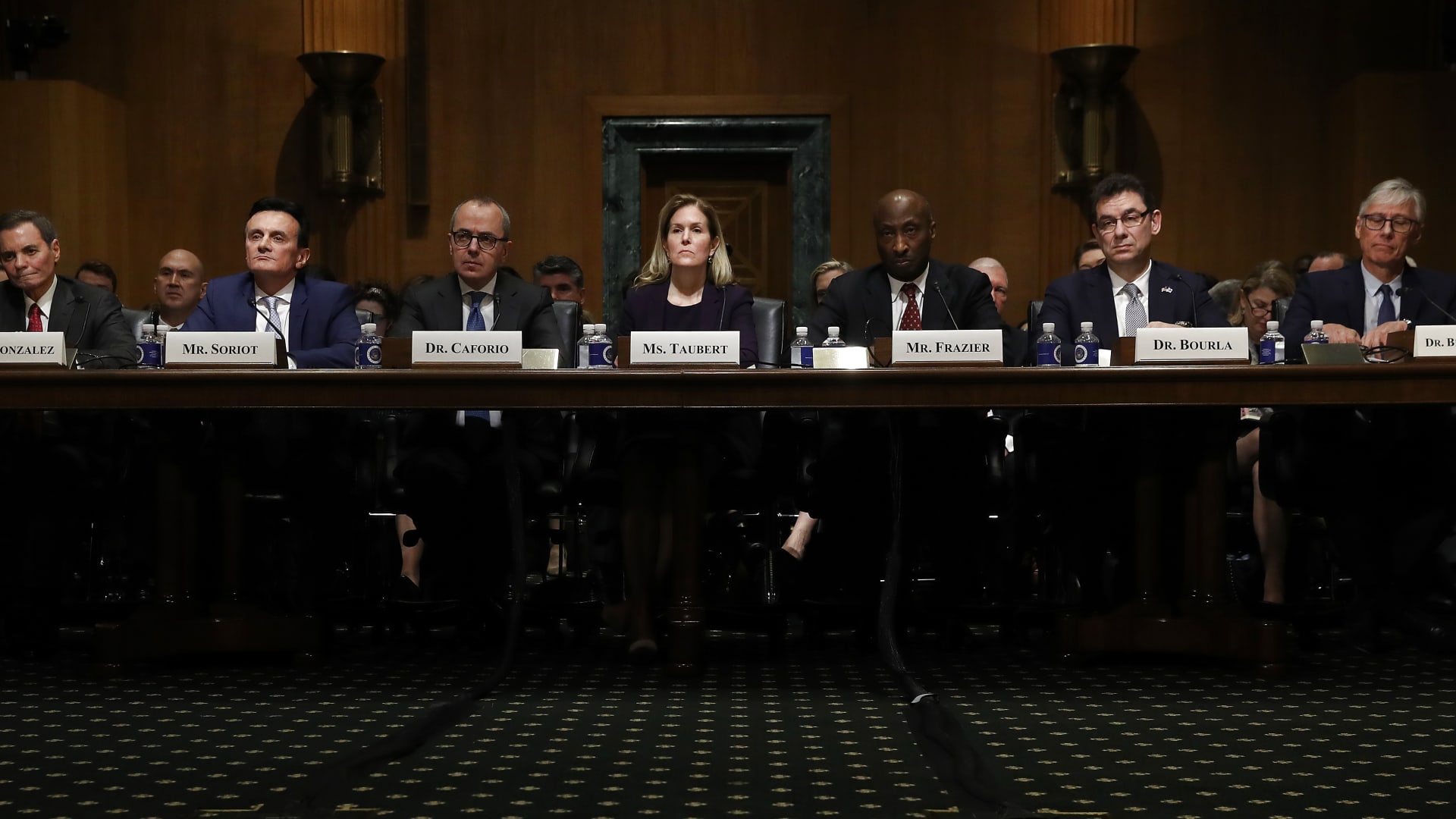On February 26, 2019, the Chief Executive Officers (CEOs) of prominent pharmaceutical companies appeared before the Senate Finance Committee in Washington, DC for a hearing on “Drug Pricing in America: A Prescription for Change, Part II.” The CEOs in attendance included Richard A. Gonzalez of AbbVie Inc, Pascal Soriot of AstraZeneca, Giovanni Caforio of Bristol-Myers Squibb Co., Jennifer Taubert of Janssen Pharmaceuticals (a subsidiary of Johnson & Johnson), Kenneth C. Frazier of Merck & Co. Inc., Albert Bourla of Pfizer, and Olivier Brandicourt of Sanofi. The image accompanying this article shows them seated from left to right.
In recent news, legal experts suggest that the pharmaceutical industry is making efforts to challenge Medicare’s newfound authority to lower drug prices for senior citizens through a Supreme Court ruling. Merck, the U.S. Chamber of Commerce, and Bristol Myers Squibb have filed separate lawsuits in federal courts in Washington, D.C., Ohio, and New Jersey, respectively, in order to challenge the constitutionality of price negotiations mandated by the Inflation Reduction Act. This legislation, passed last year, allows Medicare to negotiate drug prices for the first time in the program’s history.
Medicare’s ability to negotiate drug prices has been a long-time goal of the Democratic Party, but it is viewed as a significant threat to the pharmaceutical industry’s profitability. The companies argue that these negotiations will hinder future drug development in the United States. For example, Merck is concerned that its cancer therapy Keytruda, which accounted for 35% of the company’s $59 billion revenue in 2022, could be targeted by the program. AbbVie is defending its blood cancer drug Imbruvica, which generated $4.6 billion in revenue last year. Similarly, Bristol Myers Squibb seeks to protect its blood thinner Eliquis, which brought in $11.8 billion in sales in 2022.
While these lawsuits are the first challenges to Medicare’s new powers, they are expected to be followed by more legal battles in the future. The pharmaceutical industry’s lobbyist group, the Pharmaceutical Research and Manufacturers of America (PhRMA), has expressed support for these lawsuits and is considering its own litigation against Medicare. Industry experts believe that the lawsuits may eventually reach the Supreme Court, and the attorneys representing Merck have notable conservative backgrounds, suggesting their readiness to take the case to the highest court.
The legal battle ahead will likely be lengthy and complex. The lawsuits were filed ahead of key deadlines, including the publication of a list of 10 drugs selected for negotiations by the Department of Health and Human Services and the agreement to participate in the negotiations by the drug manufacturers. The actual price reductions resulting from these negotiations will not take effect until 2026. The companies face financial penalties if they refuse to comply with the program’s conditions or withdraw their drugs from Medicare and Medicaid rebate programs.
Legal experts anticipate more lawsuits to arise when the list of drugs selected for negotiation is released. Potential drugs on this list include Pfizer’s Ibrance, Johnson & Johnson’s Xarelto, Eli Lilly’s Jardiance, Amgen’s Enbrel, and AstraZeneca’s Symbicort. It is likely that the issue will eventually reach the Supreme Court, as different federal appellate courts may issue conflicting decisions on the matter.
The Biden administration remains confident about the legality of Medicare’s drug price negotiation law, expressing the belief that there is no constitutional barrier preventing such negotiations. Health and Human Services Secretary Xavier Becerra asserts that the administration will vigorously defend the President’s law, which has already lowered healthcare costs for seniors and individuals with disabilities.
In conclusion, the pharmaceutical industry’s opposition to Medicare’s newly granted power to negotiate drug prices has resulted in a series of lawsuits, which will likely shape the future of drug pricing in the United States. The legal battle is expected to extend to the Supreme Court, where the ultimate decision on Medicare’s negotiating authority will be made.
Denial of responsibility! VigourTimes is an automatic aggregator of Global media. In each content, the hyperlink to the primary source is specified. All trademarks belong to their rightful owners, and all materials to their authors. For any complaint, please reach us at – [email protected]. We will take necessary action within 24 hours.


